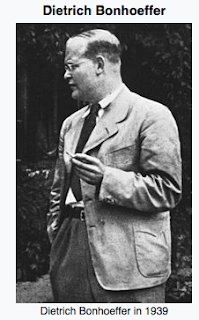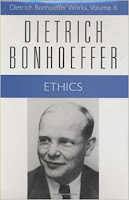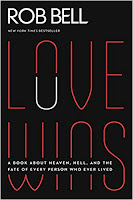Truths We Believe About God, Part 10
A Biblical & Theological Rejection of Wm. Paul Young’s
book, Lies We Believe About God
Part 1: Truths We Believe About God
Part 2: Doing the Universalist Twist
Part 3: OUR Way or THE Way?
Part 4: An Imaginary Cosmic Reality
Part 5: Universalism & Trinitization
Part 6: A Catena: The Chain of “All”
Part 7: A Catena: Universalism’s Troubles With “All
Part 8: A Catena: Universalism’s “World” and “Everyone”
Part 9: A Catena: The “Catenization” of Universalism
 |
|
| Electric barbed wire at Dachau |
“Not every one that saith unto me, Lord, Lord,
shall enter into the kingdom of heaven;
but he that doeth the will
of my Father which is in heaven.”
—Jesus, Matthew 7:21, Emphasis added.
A Review of the Book’s Chapters, Concluded
“A Final Word from Dietrich Bonhoeffer” and “Acknowledgments”
Dietrich Bonhoeffer
Paul Young concludes his book by drawing upon the emotional memory of Dietrich Bonhoeffer (1906-1945) who has achieved iconic status among evangelicals. Bonhoeffer is to be admired for opposing the evil of the Reich and paying the ultimate sacrifice for his resistance. But as Young’s quotations from Bonhoeffer’s book Ethics indicate, he apparently believed in universal salvation.[104] (LWBAG, 249-250) As William Macleod assessed:
Bonhoeffer was a universalist, believing in the eventual salvation of all. He wrote that there is no part of the world, no matter how godless, which is not accepted by God and reconciled with God in Jesus Christ. Whoever looks on the body of Jesus Christ in faith can no longer speak of the world as if it were lost, as if it were separated from Christ. Every individual will eventually be saved in Christ.[105]
The soteriology (teaching about salvation) articulated by Wm. Paul Young and C. Baxter Kruger (that Jesus’ incarnation revealed His primordial identification with humanity, that all people were positioned in Him before creation, LWBAG, 9-10, 119) bears similarity to that of Bonhoeffer’s; that people are saved not because Jesus atoned for their sins on the cross, but rather that from before time they shared being in union with Christ. Thus Jesus’ incarnation becomes a cosmic announcement of His identification with humanity and their salvation for reason of their being in Him.
Ignoring the Fall, the entrance of sin into the world and the curse upon creation (Genesis 3:1-7, 17-19; Romans 5:18-21), universalists believe the incarnation was the event which shows that from eternity all humanity was, is and forever will be united with Jesus inside the Trinity. Jesus’ incarnation and suffering highlighted His identification with humanity and that corporately, they shared in Jesus’ suffering, death, burial, resurrection and ascension. The incarnation was the event in which God wrapped His arms around humans to remind them that they’re not alone in a suffering universe, but that they really do live, move and have their being inside Jesus and the loving Trinity (Acts 17:28). Hugs all around! To quote Macleod again,
Indeed Bonhoeffer [ed., as Young and Kruger] would argue that we are saved by the incarnation—Christ taking our nature—rather than by His atoning death. He taught that in the body of Jesus Christ, God is united with humanity, all of humanity is accepted by God, and the world is reconciled with God.[106]
Curious it is however, that Bonhoeffer’s belief in universalism did not translate into the reality of his earthly ministry. As the apostate Reich Church began to dominate Germany, many pastors believed Adolf Hitler was another Christ. So opposing that church, Bonhoeffer established a seminary to train pastors to minister in congregations that shunned the Reich Church. This seminary, the ministerial alliance and these congregations belonged to the “Confessing Church” and opposed and separated from the Nazi religion.[107] Bonhoeffer’s separation from the Reich Church may indicate he was not the universalist some make him out to have been. Nevertheless when good confronts evil, subtle or blatant, “life together” does become impractical; that is, if evil is still going to be considered evil.
The Nuremburg Trials (1945-1949) during which Nazi villains were prosecuted bear this out. Human courts, lawyers and judges did not prosecute those accused of crimes against humanity because they did good but because they committed evil. Good and evil are not mutually acceptable in courts of law. So if evil and good do not belong together in history then neither will they exist together in eternity. Love does not provide cover for evil by pretending evil never existed. God, if He’s just and demands fair play in life, can’t just smooth evil over. That’s why, like it or not, the penal substitutionary atonement of Jesus Christ on the Cross was necessary and why there’s a heaven on the one hand and a hell on the other.
Sometime ago I viewed a cable TV talk show (The O’Reilly Factor) in which the host—in the context of the controversy raised by the publication of Rob Bell’s book Love Wins—interviewed a pastor and psychologist-counselor who like Bell believed in universal salvation; that in the afterlife, no eternal reality will exist called Hell. The dialog took place as follows:
Pastor McKinney: “No, I don’t believe in a literal Hell. I think it’s a historical and theological mistake.”
Bill O’Reilly: “Do you believe in a literal Heaven?”
McKinney: “Ah (smiling contentedly and assuredly), I do!”
O’Reilly: “Okay, so that means you’re going to see Adolph up there. Say hello to him for me, ’cause I got to tell you, I don’t want to be anywhere near him.”[108]
As evident from that exchange, it can be seen that the idea of universal reconciliation conflicts with the sense of fair play residing in the human conscience (Romans 2:15). So while Young calls the passages from Bonhoeffer “a” final word, we can rest assured that the paragraphs are not “the” last word. That word belongs to neither Young nor Bonhoeffer, but to God, and He has already spoken that word in His Son (Hebrews 1:1-2).
Further, by diminishing the cross of Christ as a necessary component of the Gospel (“that Christ died for our sins according to the Scriptures,” 1 Corinthians 15:3) a question needs to be asked: Do not universalists, who believe and teach that everybody’s saved, reveal they are in fact “enemies of the cross” of Christ? (Philippians 3:18)? After all, who needs the cross if everybody’s going to heaven anyway? In the next verse in the same context the Apostle adds about teachers whose faith and life do not jive with the Apostolic message and example, that “[their] end is destruction… [their] God is their belly, and [their] glory is in their shame, who mind earthly things” (Philippians 2:19). In that Young and Kruger preach a salvation that’s earth-centric—that everything’s inside the Trinity—does this not indicate they’re minding earthly things?
Acknowledgments
- Young: Young tells readers that his book Lies We Believe About God, “is built on Christology, the question of who Jesus Christ is.” He adds that, “most of the lies we believe about God” stem from “inadequate and often pathetic apprehensions of the Person of Jesus.” He concludes that because we might “believe, sadly, in a very small Jesus, our view of humanity is even smaller.” (LWBAG, 251)
- The Apostle Paul: “Wherefore God also hath highly exalted him [Jesus], and given him a name which is above every name: That at the name of Jesus every knee should bow, of things in heaven, and things in earth, and things under the earth; And that every tongue should confess that Jesus Christ is Lord, to the glory of God the Father.” (Philippians 2:9-11; see Ephesians 1:21; compare Hebrews 2:9.).
Comments: Think universally! Think big! Even though they seldom call Him Christ or the Lord Jesus Christ, Young and those who believe in universal reconciliation claim to honor a “big” Jesus—“Our Jesus is bigger than your Jesus!” So everyone who doesn’t believe in universalism is ridiculed as pathetically believing in a “small” Jesus. I assure you the Apostle Paul, as the above Philippians quote attests, neither believed in a small Jesus nor in universal salvation! In fact about his brethren the Jews he wrote in deep sorrow of heart: “For I could wish that myself were accursed from Christ for my brethren, my kinsmen according to the flesh” (Romans 9:3). Furthermore, other Prophets and Apostles of the Bible (Isaiah 9:6-7; Matthew 16:16; etc.), and for that matter Jesus Himself (Matthew 28:18), did not believe in universal reconciliation.
As has been noted previously,
one can observe that in Wm. Paul Young’s novel, The Shack, Jesus is never referred to as ‘Christ’ or ‘Lord’…. [W]e ought all remember that “no one can say, ‘Jesus is Lord,’ except by the Holy Spirit” (1 Corinthians 12:3). If we should find a deficiency within us making it difficult to refer to Jesus as “Lord” there may be an indication of a deeper problem going on within our souls….[109]
Let me say at this juncture, I will choose to believe the Apostle’s testimony about the Lord Jesus Christ rather than Paul Young’s about Jesus.
 |
| Berlin, 1945 |
To be concluded . . .
Endnotes:
[104] Dietrich Bonhoeffer, Ethics (New York, NY: Simon & Schuster, 1995). Many evangelicals deny that when considered in their totality, Bonhoeffer’s writings indicate he was a universalist. At the time of his death, His Ethics was a work in progress and perhaps not what he intended to have published. Eberhard Bethge, the editor of Ethics, wrote that the book, “is a compilation of the sections which have been preserved, some of them complete and others not, some already partly rewritten and some which had been committed to writing only as preliminary studies for the work which was planned.” (p. 11). As has been pointed out, Bonhoeffer’s actions toward the Reich in life contradicted his belief in universalism. Nevertheless, whether accurate about what he believed or not, Bonhoeffer’s words remain, and Young thereby seeks Bonhoeffer’s support for his universalism.
[105] William Macleod, “Bonhoeffer—A Reliable Guide?” Banner of Truth, September 23, 2016 (https://banneroftruth.org/us/resources/articles/2016/bonhoeffer-reliable-guide/). Macleod acknowledges his summary of Bonhoeffer’s theology was indebted to “The Troubling Truth About Bonhoeffer’s Theology,” by Richard Weikart, Christian Research Journal, Volume 35, Number 06 (2012).
[106] Ibid.
[107] Mark and Barbara Galli, “Dietrich Bonhoeffer: Did You Know?” Christian History, Issue 32 (http://www.christianitytoday.com/history/issues/issue-32/dietrich-bonhoeffer-did-you-know.html).
[108] Personally transcribed from You Tube, Bill O’Reilly, “Is there a Hell?” O’Reilly Factor, April 26, 2011. Interview can be viewed on You Tube. (http://www.youtube.com/watch?v=e-IjuXSoGrk).
[109] Pastor Larry DeBruyn, “Jesus Talk,” Guarding His Flock Ministries, April 19, 2010 (http://guardinghisflock.com/2010/04/19/jesus-talk/#more-957)




